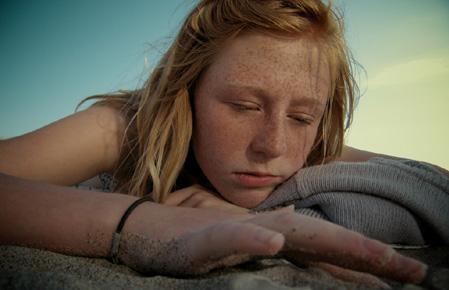In Alice de Champfleury's "Sun Shine", Nadja, who is 13, whiles away her summer vacation lazing on the beach. Fascinated by a small, perfect-looking family, she starts spying on them. A boy she meets, Eskild, and she lets him in on her voyeuristic project, which gradually grows more extreme.
"You get a new consciousness and start defining yourself in a new way. It's the time when you first start distancing yourself from your parents (...), while you more than ever need to feel your parents' support. It can be hard for a teenager to create the necessary distance, if there is no one to distance herself from." – Alice de Champfleury
"It's a story of longing and loneliness in adolescence," the director says. "In puberty, we go through a huge mental and physical transformation, triggering many new and unfamiliar feelings that are hard to share with others. "Adolescence is an age of huge paradoxes. You're in a no man's land between childhood and adulthood. Maybe your legs suddenly grow really long and your body is out of whack in a way that feels inhibiting. Your feelings come out as impulses, veering from one extreme to another. It's this imbalance I wanted to describe in "Sun Shine"," de Champfleury says.
Pale and vulnerable
"Sun Shine" takes place during summer vacation – a wonderful time of year for most people, the director says, but especially hard to endure for someone like Nadja who is already having a hard time.
"Summer vacation is when families spend time together and you're expected to have a good time. Feeling bad is worse when the sun is shining and everyone else is having fun," de Champfleury says. The director also chose summer as a frame for the story to underscore the peculiar vulnerability of adolescents.
"In summer you're physically exposed, because you walk around without a lot of clothes on. You're in touch with your body and your senses in an entirely different way than in winter. I deliberately did not have my young actors be tanned but chose to keep their skin pale, flush and translucent, in contrast to the strong sun and lush woods, to highlight their sensuality and vulnerability."
Depicting a state of flux
As de Champfleury sees it, summer vacation, like adolescence, is a temporary state where the everyday is left behind, time ceases to exist and a void emerges. Depicting that state was important to the director.
"When you're 13, full of longing and loss, it can seem like a very lonely and confining state to be in. I have a crystal clear memory of that state from my own adolescence. The story springs from that state, that feeling – they are the main things I wanted to express. My films always hinge on the characters' emotional development. In "Sun Shine" I wanted to try and do something with mental states by depicting an isolated 13-year-old girl, longing and fantasizing."
Yearning for a family
"Sun Shine" shows Nadja missing a father. Her mother she keeps at arm's length, while imagining that a father is the piece that's missing from her life. To de Champfleury', adolscence is the opening of the great search for identity.
"You get a new consciousness and start defining yourself in a new way. It's the time when you first start distancing yourself from your parents and seek an independent identity, while you more than ever need to feel your parents' support. It can be hard for a teenager to create the necessary distance, if there is no one to distance herself from," the director says.
"The film is also a lot about being in or out of contact. Nadja has no real contact with her mother, the world around her or even herself. She comes in contact with a boy but fails to keep it. The film does not end on an up-note, though she does manage to poke a tiny hole in her shell. There's a small opening and a chance that she will grow."
Childhood – something you carry inside
De Champfleury previously made "Ernst", an animated film about a small boy and his mother. Her last short, "The Caravan", is about a nine-year-old boy. But she does not consider her films to be actual children's films.
"I'm not out to make films for children but films about childhood and, in this case, the grey zone beyond it. I'm happy if my films speak to children, but it's not something I think about when I write. I immerse myself in my characters, whether they are 5, 13 or 20 years old, and always work from my own personal material. Childhood is an exciting field, because it's something you carry inside your whole life. It's when the first cornerstones of your personality are laid, and the first unforgettable steps and losses are experienced."
